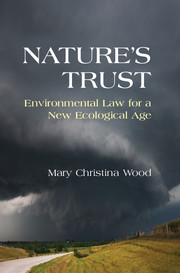Book contents
- Frontmatter
- Dedication
- Contents
- Preface
- Acknowledgments
- Part I Environmental Law: Hospice for a Dying Planet
- Part II The People’s Natural Trust
- Part III The Public Trust and the Great Transition
- 12 Nature’s Trust and the Heart of Humanity
- 13 Using Earth’s Interest, Not Its Principal
- 14 The Public Trust and Private Property Rights
- 15 The New World: A Planetary Trust
- Notes
- Index
13 - Using Earth’s Interest, Not Its Principal
Published online by Cambridge University Press: 05 June 2014
- Frontmatter
- Dedication
- Contents
- Preface
- Acknowledgments
- Part I Environmental Law: Hospice for a Dying Planet
- Part II The People’s Natural Trust
- Part III The Public Trust and the Great Transition
- 12 Nature’s Trust and the Heart of Humanity
- 13 Using Earth’s Interest, Not Its Principal
- 14 The Public Trust and Private Property Rights
- 15 The New World: A Planetary Trust
- Notes
- Index
Summary
In May 2010, citizens across the world watched in horror as a geyser at the bottom of the sea gushed millions of gallons of oil into the Gulf of Mexico. After puncturing the ocean’s floor, BP had no way to hold back the hemorrhage. Yet, when President Obama responded by imposing an emergency moratorium against deep-sea oil drilling, Louisiana Governor Bobby Jindal drew his political daggers and accused the president of stealing 6,000 jobs away from Louisiana workers. He complained that the moratorium’s impact on drilling jobs compounded the “huge economic losses” inflicted on the state’s seafood and tourism industry from the spill.
Louisiana citizens should have choked on the governor’s whopping contradiction, but instead they swallowed it whole. In the Gulf Coast region, politicians demand – in the same breath – pristine beaches, abundant shellfish, teeming marine life, and an industry that, with just one blowout, can slime the waters and murk the sands with millions of gallons of toxic petroleum. As the old saying goes, you can’t have your cake and eat it too. But like so many Americans, Louisianans become easily roused by fighting talk that focuses on the economy. Just weeks after Governor Jindal’s tirade, the Louisiana fervor erupted into a “Rally for Economic Survival” at which time the governor declared, “We’re in the middle of a war to defend our way of life…. [L]et our people work.”
- Type
- Chapter
- Information
- Nature's TrustEnvironmental Law for a New Ecological Age, pp. 282 - 306Publisher: Cambridge University PressPrint publication year: 2013



